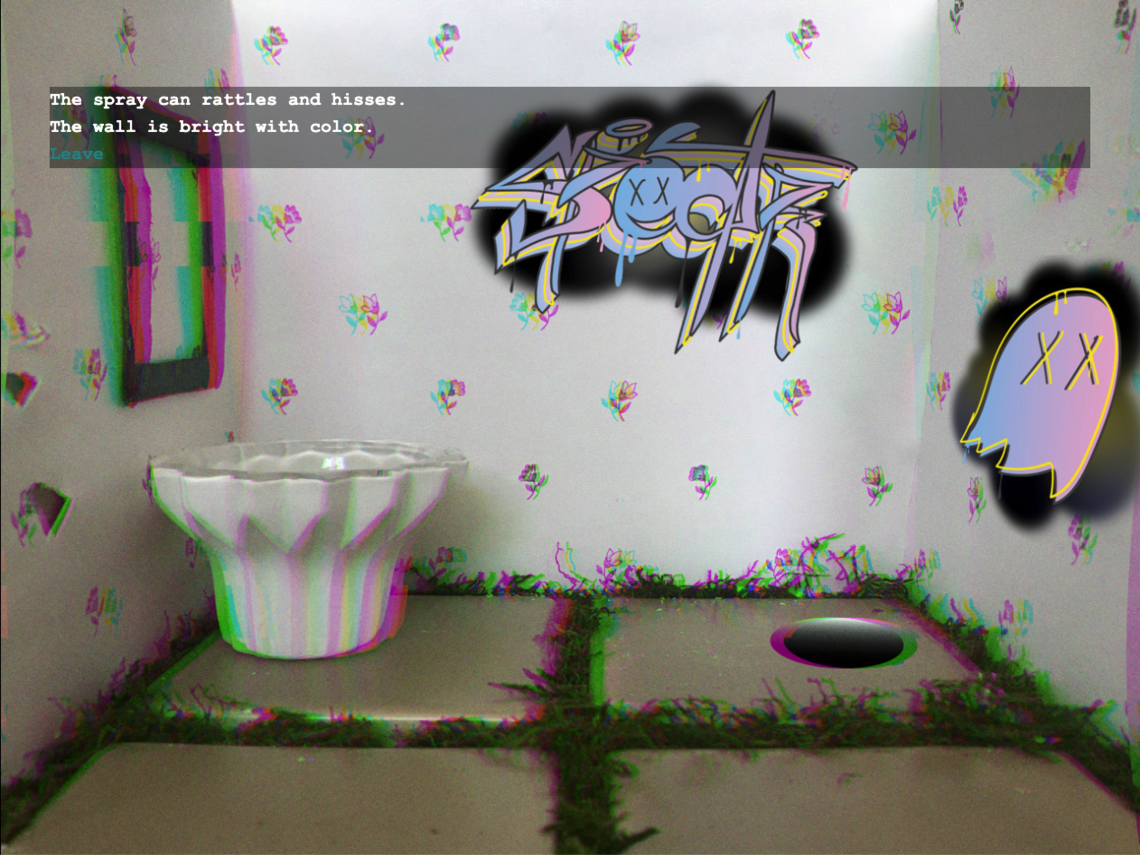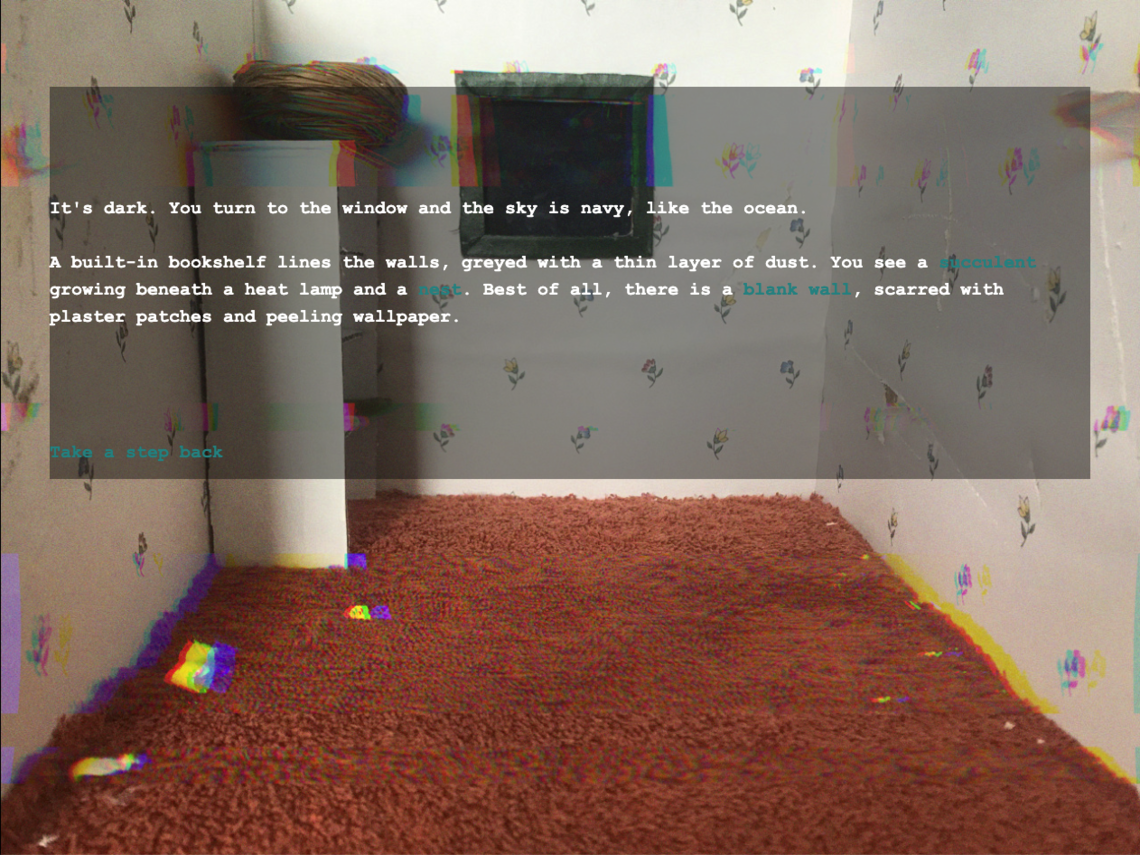
June 18, 2021
Teaching through a pandemic calls for creativity, flexibility
When Dr. Mary Grantham O’Brien, PhD, first learned that UCalgary classes for the 2020-2021 academic year would be taught online due to the ongoing COVID-19 pandemic, she vividly recalls “a moment of panic.”
- Photo above: An image from the video game Papster by Mira Martini with art by Tobi Martini, students in English professor Derritt Mason's course on queer theory and video games. Image courtesy Mira Martini and Tobi Martini
“When I thought about teaching the German language online, I really thought this is something I couldn’t do,” says the professor of German phonetics in the School of Languages, Linguistics, Literatures and Cultures (SLLLC). “I wondered: How is this even possible? Instructors and students need to be together to interact in the language. How can I get our students to engage, using the language, when they can’t be close to one another?”
To be sure, O’Brien wasn’t the only Faculty of Arts teacher who was shaken last year, thrown into the deep end of online teaching — along with professors from across the university — as COVID-19 forced a global lockdown. This forced pivot in teaching saw many professors rise to the challenge with true ingenuity, creating engaging online spaces and meeting the needs of their students in new and creative ways.
In O’Brien’s case, this included the assigning of weekly video journals for her students. “I provided them with a list of questions at the beginning of the semester and each week they could choose the question they wanted to answer in German, via the videos,” she says. “This provided an opportunity for each student to practise German with me and it was also an opportunity for me to get to know the students. Because of the pandemic I had never actually met the students in my class, and that face-to-face interaction is an important part of language teaching.”
For that reason, O’Brien encouraged her students to leave their cameras on during Zoom classroom sessions and in breakout rooms, explaining that facial nuances are often a key component in language learning. “There’s an interpersonal space created by seeing one another,” explains O’Brien. “If somebody is speaking to me and I don’t understand what they’re saying I might squint my eyes and the student will pick up on that. And it’s important for me to see how a student is producing sounds. Vowels are rounded, for example, and you can see this rounding in their facial expressions.”
Opportunity for creativity
O’Brien also created an assignment in which students were tasked with dubbing silent videos in German.
It was a really fun assignment that gave the students an opportunity to be creative. I never would have done that pre-COVID, because the lessons were more traditional, but when the pandemic is behind us, I think I’ll continue to incorporate assignments like this.
Philosophy professor Dr. Richard Zach also enhanced the online teaching experience for students in his Philosophy of Logic class, teaming up with a colleague at the University of Victoria who was teaching similar material. Students at both universities were invited to each other’s Zoom classes, assignments were co-ordinated, and they used a shared online discussion board.
“We only graded our own students’ assignments, of course, and grades were only shared on our respective D2L servers,” says Zach. “But the co-ordinated classes made for a lively community, and, I think, a much better course than each of us would have had on our own.”
Recognizing the challenges his students were facing with online learning, Zach also introduced a “specifications based” grading system and the use of tokens that students could use to buy extensions or re-do assignments. Students had to complete 36 assessments, which included “timed exam-like questions,” multiple choice questions and various problem sets.
“Rather than arbitrarily assigning grades to each assessment, my students would earn grades by passing a set number of assessments which corresponded with the week’s learning goals. So, you could pass if you mastered half the learning goals and you’d get an A if you mastered all of them, with marks in between these goal posts as well. This gave students some control over which aspects of the course they chose to focus on and clarity as to what grade they had earned.”

An image from the video game Spectr by Eden Middleton and Anna Navarro students in English professor Derritt Mason's course on queer theory and video games.
Courtesy Eden Middleton and Anna Navarro.

Mason was one of many professors in Arts who adapted his teaching style during COVID, creating engaging online spaces.
Image courtesy of Eden Middleton and Anna Navarro
As for Dr. Derritt Mason, PhD, associate professor in the Department of English, he taught a Queer Theory and Video Games class wherein his students were encouraged to create their own digital games. As well, in his Literature for Young People course, he created a podcast lecture series wherein he tried to incorporate facets of active learning, such as the spontaneous quizzes included in every episode.
Mason also specifically designed assignments for the online environment. In one of these he had students digitally explore the Baldwin Library of Historical Children’s Literature and report on their findings.
Dr. Rachel Friedman, PhD, an instructor of Arabic languages in SLLLC, also introduced virtual tours to her classes. Pre-COVID she would assign a “cultural portfolio project” wherein students would engage in Arab cultures experientially, by attending cultural events, interviewing someone from the Arab-speaking world, or even visiting a Middle Eastern grocery store. Students would then be tasked with writing reflectively on what they observed and learned.
With the move onlin, she had students choose an online cultural activity to do, such as taking virtual tours of markets in the Arab world. Via Zoom, students were also able to interview people in Arab countries and attend cultural events that took place in Arabic.
“Before COVID-19, I had envisioned the project as focusing more on what is physically available in Calgary and on a small set of conventional online materials such as songs and videos,” says Friedman. "But during the pandemic both myself and my students re-envisioned more creatively what kinds of online cultural engagements are possible.”
I’ll definitely keep the virtual cultural exploration options available when we return to in-person learning. It’s effectively expanded the ways in which students engage with Arabic-speaking cultures.
Flexibility of hybrid models of teaching
Mason, too, is looking into “hybrid models” of teaching, which would continue to incorporate certain aspects of online learning, even after classes are once again in-person. “I’d like to keep the podcast lecture series going,” says Mason. “It allows students to listen on their own time. I think there are a lot of advantages to that added flexibility.”
Meanwhile, Friedman also took advantage of the whiteboard and annotation tools on Zoom while teaching students how to write the Arabic alphabet. “I had students practice writing letters and words all together on the Zoom whiteboard so that everyone had a chance to practise at the same time,” she says. “This allowed me to provide feedback and corrections in a low-stress way, without drawing attention to any one student.”
Craig Maynes, a senior instructor in the Department of Classics and Religion, admits that at times he felt overwhelmed by the online teaching experience. Even so, he implemented a number of practices which proved popular with his students, including the use of an online platform that allowed the students to discuss their readings at their leisure in a social media style. He then held a weekly Zoom session that focused on those online discussions.
But Maynes feels that the most important thing he offered his students in the move to online teaching was compassion. “On the assumption that we are all suffering in our own ways due to the pandemic, I went into the year with the attitude that compassion would guide all my decisions,” he says. “I was explicit about that, and I asked for the same in return. This created a community of people who were all just doing their best, and who cared for and about each other. I feel like the students deserve just as much recognition for this.”
Mary Grantham O’Brien, Craig Maynes, Derritt Mason and Richard Zach were winners of the 2021 Students Union Teaching Excellence Awards. Rachel Friedman was a 2020 winner of the Students Union Teaching Excellence Awards





